The new normal: Nancy Lieberman still blazing trail for women in basketball
Nancy Lieberman wasn't sure what to expect when Rick Barry invited her to be his guest assistant coach for a BIG3 game in Dallas during the league's inaugural season last year.
"I walked in with no expectation," Lieberman told theScore last week. "And there were fifteen, sixteen thousand people there. I'm like, you've gotta be kidding. I was blown away. It was a melting pot of people. It was high-energy, high-intensity on the court."
So, when the phone rang a few months later with an offer to replace Clyde Drexler as the head coach of Power, one of the BIG3's eight teams, Lieberman - whose most recent coaching stint had come as a Sacramento Kings assistant during what can charitably be described as a tumultuous time for the franchise - jumped at the chance. A year later, she's coaching a squad led by Corey Maggette, Cuttino Mobley, Glen Davis, Quentin Richardson, and Chris Anderson while owning the league's best record.
It's just the latest stop in a winding, eclectic, trailblazing career for the 60-year-old basketball lifer. Lieberman, who grew up as a self-described "poor, skinny, redheaded Jewish girl from Queens," forged a legendary playing career that began in Rucker Park and included exploits in international competition with Team USA (starting when she was in high school), two national championships at Old Dominion, a spot on the Los Angeles Lakers' Pat Riley-coached summer league team, a stopover with the Washington Generals, a run with the Phoenix Mercury at age 39 during the WNBA's maiden season, and a one-game return to the league as a 50-year-old. She was inducted into the Basketball Hall of Fame in 1996.
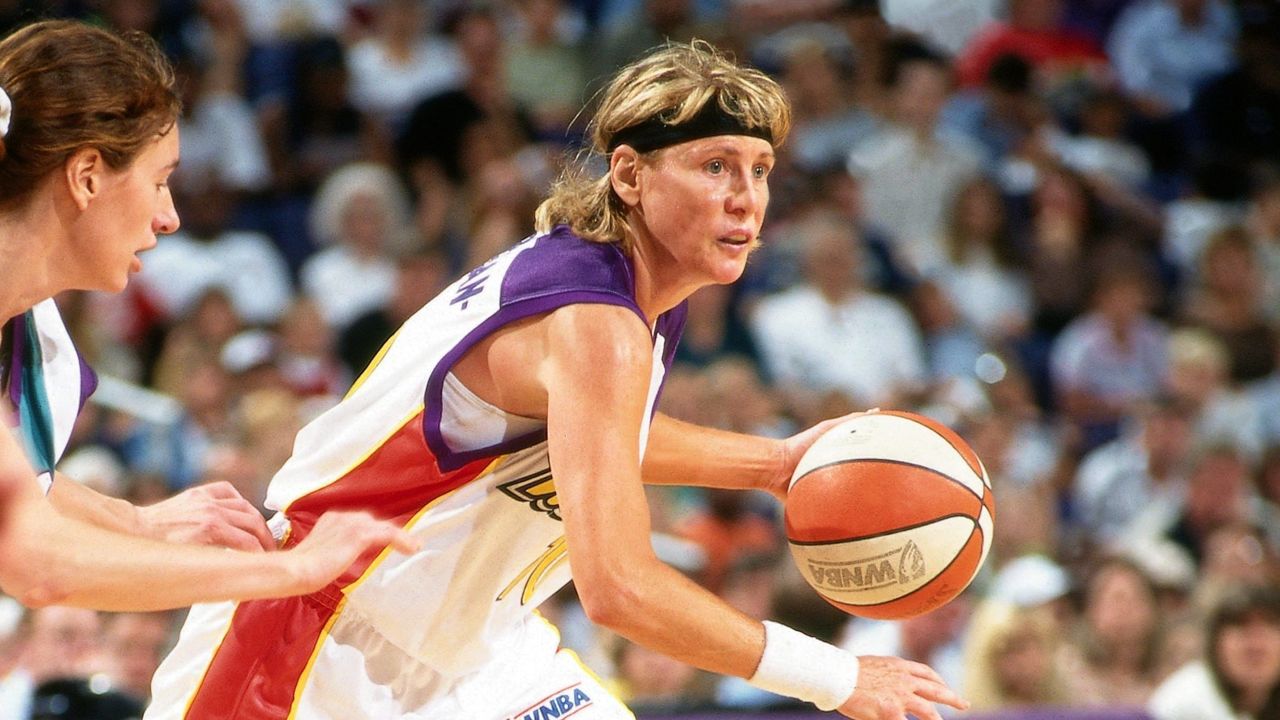
After her playing career, Lieberman spent time as the general manager and head coach of the WNBA's Detroit Shock. In 2009, she was hired as the coach and assistant GM of the Dallas Mavericks' D-League affiliate, the Texas Legends, becoming the first woman ever to coach a men's professional basketball team. Next came the assistant job in Sacramento, followed by a long-overdue work hiatus, a spell with the New Orleans Pelicans' broadcast crew, and finally, the call from Ice Cube, and a job in his barnstorming three-on-three league.
'She's really grinding with us'
As a concept, the BIG3 can sound gimmicky, or desperate. But that notion evaporates when you hear the genuine enthusiasm and pride that Lieberman exudes about her players, or see the focus and intensity with which she stalks the sideline and calls out plays during games.
"I get a chance to set the tone that I'm a real coach," she explained. "Our guys can say, 'She's organized, she's breaking down film every week for us.' They get a scouting report every Sunday, breaking down every player, their strengths and weaknesses, how I think we can attack them. They have structure."
"She's intense, man," Richardson said of Lieberman on the "BIG3 Show" last week. "She takes it as serious as any coach that I've had. And I appreciate that about her, that she's not just here for (a paycheck). She's here to really win, she's really grinding with us."
Competition, expectations, and stakes are vital components of any worthwhile job, but while those motivators still clearly exist for Lieberman, this BIG3 gig also feels refreshingly uncomplicated. She hasn't encountered a power struggle, or politics, or an intractable culture of cronyism and exclusivity. She can't stop singing Ice Cube's praises. She feels like everyone has her back. She feels free to focus on coaching.
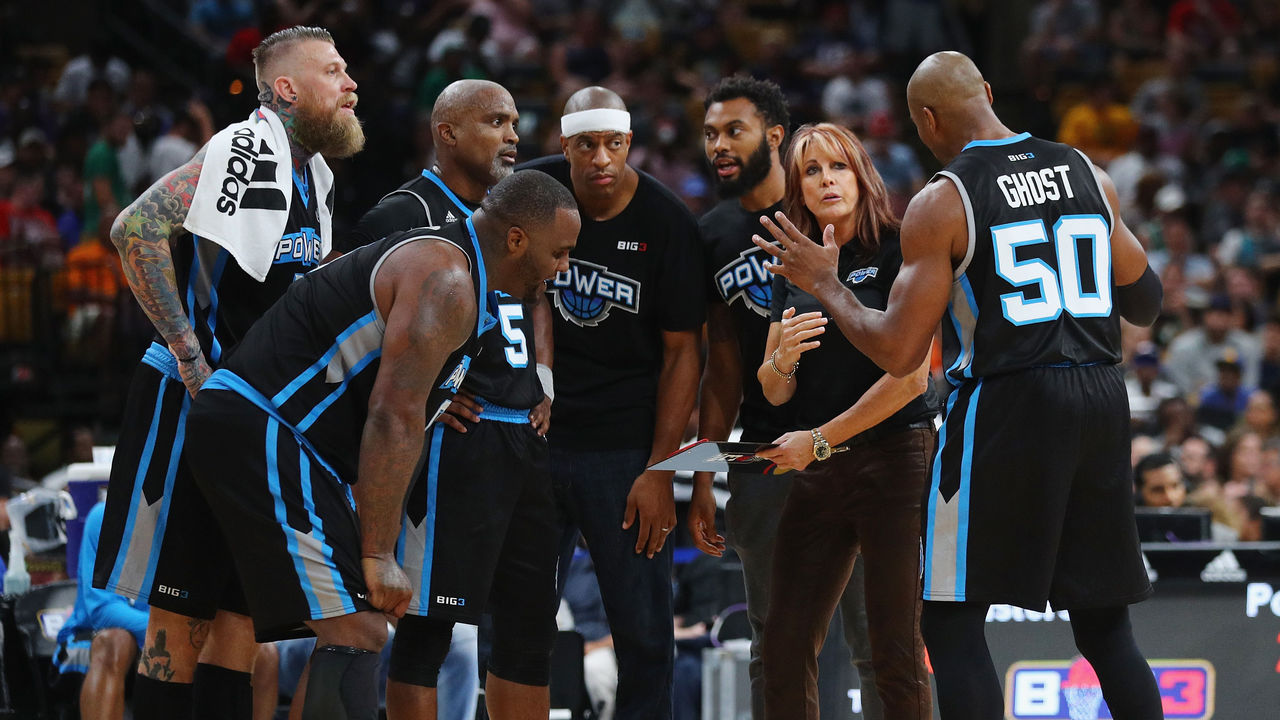
It wasn't quite like that in Sacramento, where Lieberman was thrown into a volatile situation with an underperforming team and a head coach in George Karl who was engaged in a cold war with both the front office and with franchise player DeMarcus Cousins. As Karl grew paranoid about divided loyalties among his staff, Lieberman - an ally of owner Vivek Ranadive and general manager Vlade Divac - found herself increasingly isolated from the rest of the coaches.
"I think what made it more difficult was not being part of George's 'I'm bringing the band back' with the Denver guys," Lieberman said of her fellow assistants in Sacramento - many of whom had previously worked under Karl with the Denver Nuggets.
"I remember sitting in my room one day in Miami, getting ready to go to a meeting, and I'm looking at the ticker on ESPN, and it said, 'Vivek Ranadive says if he fires George Karl, he's hiring Nancy Lieberman as his head coach.' And I went, 'No. No. Take that off the TV.' I mean, that's what I'm saying to myself. I knew that was going to make it really difficult for me. It was going to put me on the outside of that circle of trust. ...
"I just did my job to the best of my ability. You have to put your head down, stay in your lane, and try not to get caught up in all that other stuff. It's too easy to fall into that trap. And I think that ticker was damning for me."
The fraught situation also made it hard for Lieberman to navigate the interpersonal element of coaching - the part of the job she appears to enjoy most. She reminisces fondly, but also somewhat ruefully, about working with Cousins during that time.
"He had a contentious relationship with George, which was not good for anybody," Lieberman said. "If DeMarcus wasn't talking to any of the coaches, how could I be talking to him? I had to be aligned with our staff."
'The world is not perfect'
Lieberman ultimately left the NBA on her own terms, to spend time with her ailing mother. The promotion to interim head coach, promised by that ill-fated ticker, never came to pass, but she's not sure she would've been prepared for it yet, anyway.
"There was a pretty good learning curve for me," she said. "I don't know that I could go from stepping into the NBA to being a head coach."
Still, for all the turmoil she dealt with, Lieberman betrays no trace of bitterness about her first NBA foray. She also doesn't see her imperfect Kings tenure as a cautionary tale for other women with aspirations of coaching in the league.
"It just depends on the person you're working for, and if they want to mold and mentor you for the next level," she said. "I think Vlade and those guys saw it like that for me, but I think George had so much going on that there was no mentorship toward me."
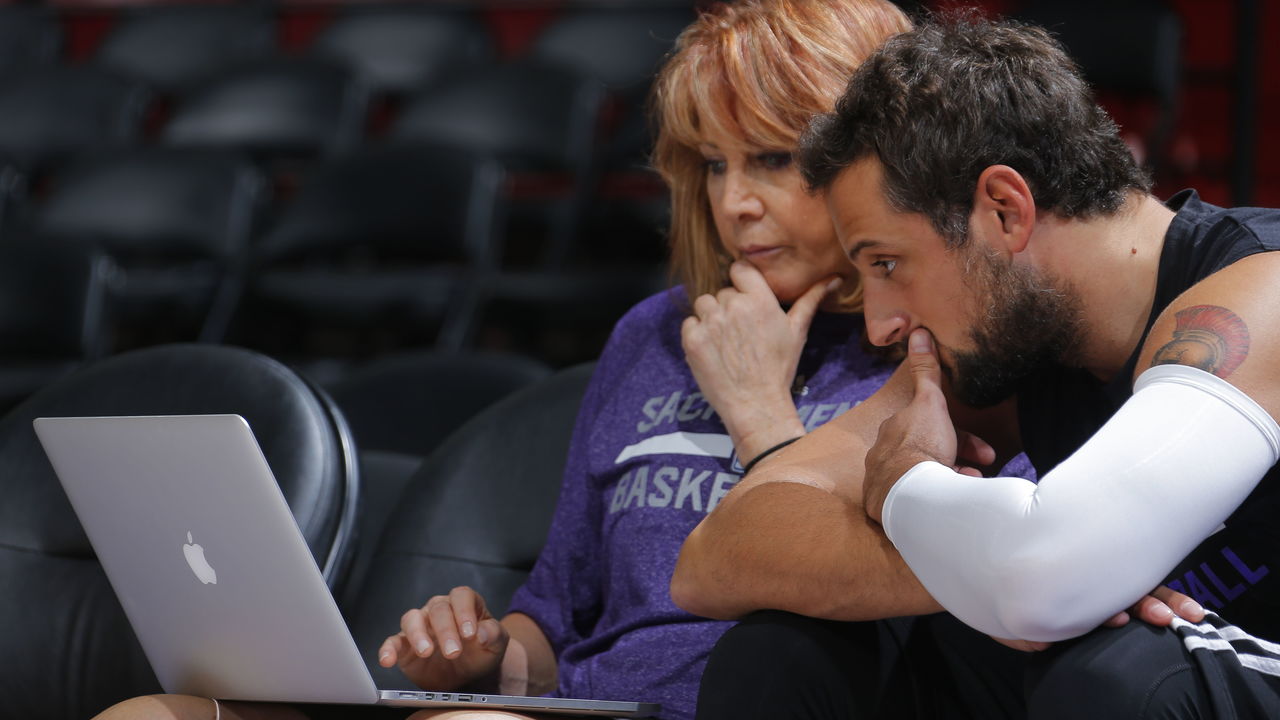
It's here that Lieberman draws a distinction between herself and Becky Hammon, who's been on the San Antonio Spurs' coaching staff under Gregg Popovich for the last four years, and who became the first woman ever to interview for an NBA head coaching job this offseason.
"Becky will be a head coach in the NBA one day," Lieberman said. "She has paid her dues, she has been mentored by one of the great coaches in the history of the game (Popovich), and she's had some protection, because he wants to help accelerate her to the next level."
Lieberman also doesn't put much stock in the mini-controversy that took shape on NBA Twitter in the wake of Hammon's head coaching interview, when some analysts suggested she was "jumping the line" from her role as a back-bench assistant with the Spurs (who've since promoted her to the front row).
"Look, there are going to be naysayers out there, there's going to be jealousy. It's human nature," Lieberman continued. "If somebody sees somebody behind the bench getting these opportunities, (they should) just let it go. Just let it go. The world is not perfect. Someone wanted to interview her, and you have to mind your business."
'We have to bring the goods'
Hammon and Lieberman were the first female coaches to get their feet in the NBA door. Jenny Boucek, who worked for the Kings after Lieberman and has since been hired by the Mavericks, soon followed. Boucek and the Mavs even broke down another barrier this year when she decided to get pregnant and raise a child on her own, with the team's full support.
But while the NBA is outpacing the other major North American sports leagues in terms of gender diversity in management positions - women occupy nearly 40 percent of jobs in the league office - it still has a long way to go when it comes to equal-opportunity hiring practices in the coaching ranks. Although Lieberman is optimistic about the direction things are moving and lauds commissioner Adam Silver for his progressivism, she still puts much of the impetus on her fellow women to help shift the paradigm.
"When your commissioner says he wants to see a female head coach in the league sooner than later, (it means) he has the wherewithal to talk to ownership and say, 'Hey, we have to do this right and give these people opportunities,'" Lieberman said.
"If they're qualified," she added after a beat. "We have to bring the goods, too."
Lieberman remembers talking to then-NBA commissioner David Stern while she was coaching in the D-league, and telling him she wanted to work on an NBA bench. Stern told her to spend more time around the people who could hire her for such a job, and about an NBA coaching symposium she should attend. But the symposium was the same weekend as the Basketball Hall of Fame enshrinement ceremony, which Lieberman went to every year. She told Stern she was leaning toward going to the enshrinement. "He replied, 'That's who you were,'" Lieberman recalled. "And it was like, the light clicked on."
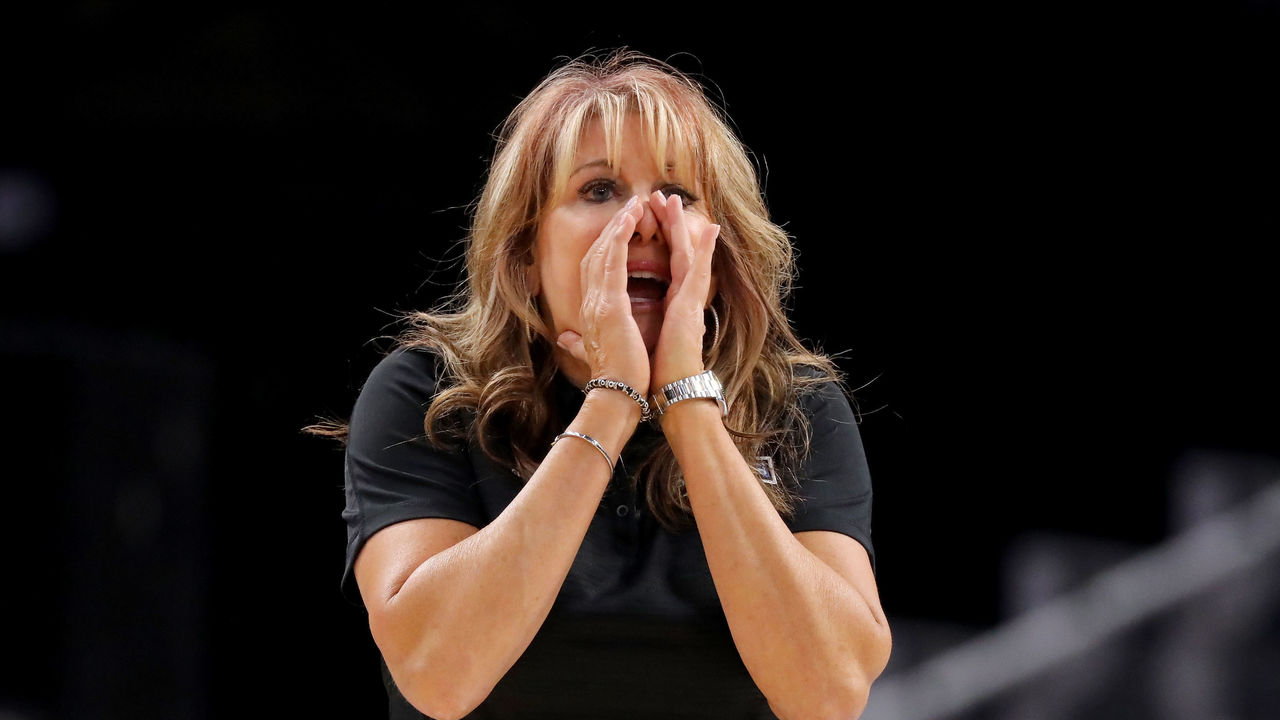
She internalized that message, and followed through on Stern's advice while passing it on to other women who are now forging a similar path.
"I was on my own nickel for four years for the August NBA coaches camp, flying myself out," Lieberman said. "But all of a sudden I was mixing and mingling with head coaches and GMs. They get a chance to see your work ethic, you blend in, it's very normal. I was the only woman at (former NCAA/NBA coach) Tim Grgurich's camp for four years. I was the only woman at the NBA symposium for four years. And now Jenny is there, Lindsey Harding is there, Kristi Toliver (former WNBA players).
"We all have to make time to create relationships. We need more women going to those coaching camps, integrating with the men that are potentially going to hire us. You never know who your next boss is going to be."
Perhaps one day, the league's power structure won't be so dependent on men to make hiring decisions. In the meantime, there are women like Lieberman and open-minded men like Popovich helping to kick down doors.
"It's important that you've got people in your corner," Lieberman said. "I don't know where I would've been without (Mavericks GM) Donnie Nelson. When your boss, like Popovich, like Adam Silver, is so positive in wanting this to happen, you feel like you can slay a dragon."
'I'm glad it's me'
Lieberman herself isn't sure who her next boss will be, and whether the BIG3 will be a means to an end, or an end in itself.
"I get people who talk to me about, 'Do you want to coach in the WNBA?' Colleges come to me each year, I'll get two or three schools that reach out," she said. "I'm just at a really awesome place. I'm not seeking (another NBA job right now). I love the game, and if I'm given an opportunity, I will grind. I'm not tired of grinding, I'm not tired of working, I'm not tired of being around the best minds in the world, and learning. So, if I were given another opportunity, I'd have to look at it. But I'm really happy in the BIG3. I would run through a wall for Ice Cube. I think he is one of the most unbelievable human beings I've ever been around."
Regardless of where she lands, you can be certain Lieberman will take her job seriously, not least because she knows there are those who will look at her as an example, and still others who will consider her performance a referendum on the viability of female coaches in a historically patriarchal sport.
Lieberman feels the weight of that responsibility, but the word she uses most often when talking about her place in the basketball world is "normal." For someone who's spent the balance of her life standing out, she's surprisingly eager to blend in.
"You have to remember, I've been doing this since I was 15, when they said, 'You're too young to make the Olympic team because you're in high school,'" she said. "So, this is normal for me. Playing against guys, playing in Rucker Park, playing for Pat Riley - I knew he didn't want me, and I ended up being his starting point guard. To me, pressure is a privilege. To be given that role is normal for me."
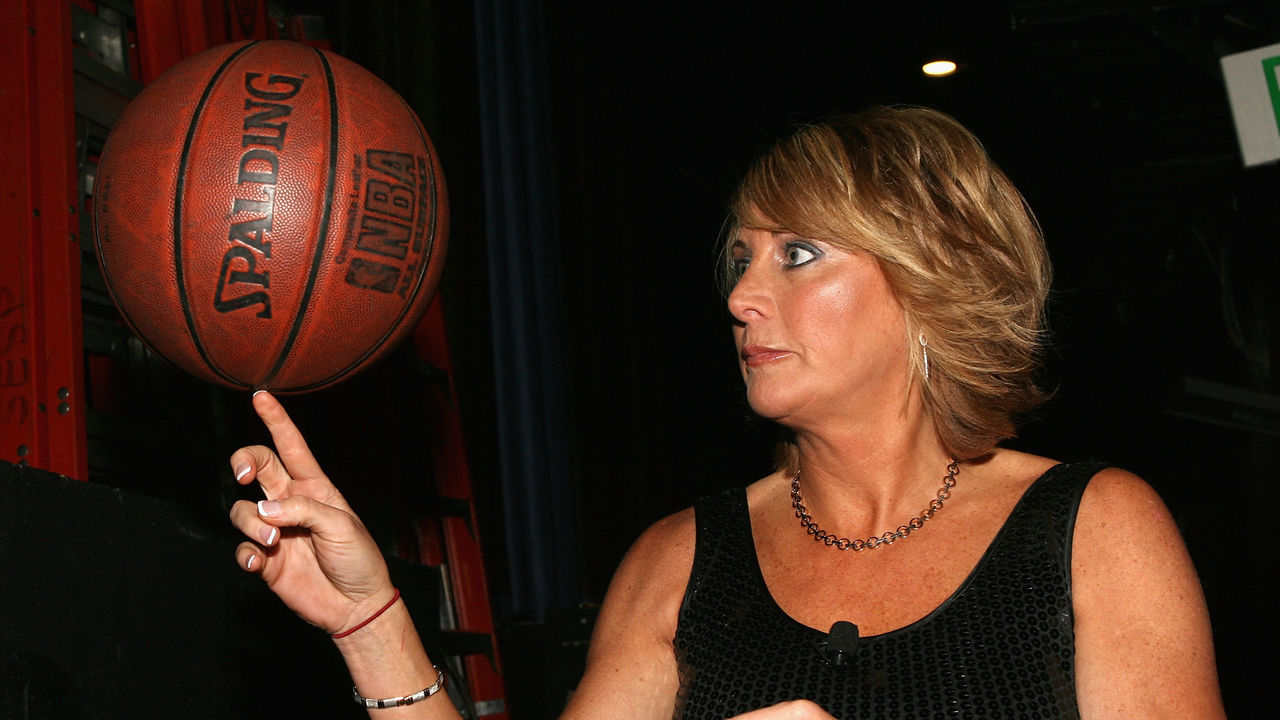
That crystallized for Lieberman when she visited the White House in 2010 at the invitation of Barack Obama.
"President Obama comes over," she recalled, "and he says to me, and I'm paraphrasing, he goes, 'It's normal for me to be a black man. It's normal for you to be a woman coaching men. I just happen to be the President of the United States. You just happen to be the head coach in a men's league. It's normal to us. It's not normal to the outside world. And it's our job to make it normal.' And that's how I've lived my life."
Just don't confuse normalcy for ordinariness, or think that Lieberman completely blocks out all the noise around her.
"It's not lost on me, my responsibility," she said. "I clearly know when I walk out of the house who I am, and my responsibilities. I just feel like I'm where I’m supposed to be. And I'm glad it's me, because I feel like I know how to handle it."
(Photos courtesy: Getty Images)
HEADLINES
- Charles headlines Athletes Unlimited's roster for 5th season
- Project B women's basketball league to play in Tokyo in April 2027
- WNBA, players agree to moratorium, pausing initial free-agency stages
- WNBA, union fail to reach new CBA, talks to continue without extension
- Liberty's Stewart: WNBA, WNBPA won't extend CBA deadline